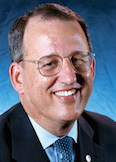Searching for a New President
Posted on Sept. 15, 2005Several years ago at a professional conference, Stephen Portch, then president of the University System of Georgia, began his keynote address with these words: “Every morning, I remind myself that I really don’t exist. A system has no students, no faculty, and no alumni. …” Another president later told me privately that he was troubled when he arrived as the new head of a Midwestern system to find that the system was “running too many things that should be on one of the campuses.” He noted that the primary functions of systems are to assemble and advocate for budgets, review and approve new degree programs, and select and evaluate campus chief executive officers. He believed that anything else taken on by systems distracted them from being effective in achieving their primary functions.

Doug Dibbert ’70
As Molly Corbett Broad, who began serving as UNC System president in 1997, prepares to step down from that role, the importance of the choice of her successor cannot be overstated. Over the past 73 years, the UNC System has enjoyed strong leadership from Frank Porter Graham ’09 (1932-49), William D. Carmichael (acting president, 1949-50), Gordon Gray ’30 (1950-55), William C. Friday ’48 LLB (1956-86), C.D. Spangler ’54 (1986-97) and Broad.
There are growing expectations that the UNC System and its 16 campuses — with a budget of $5 billion and the responsibility for educating nearly 200,000 students — will face greater competition for limited resources. Additionally, the public expects education to address a growing list of social and economic concerns. How will the UNC System accommodate a continuing growth of new students? How will it respond to growing demands for greater accountability? How will it reconcile the desire of the Charlotte campus to become a third research university within the system and the limited resources available for such a costly undertaking?
The Presidential Search Committee is reviewing the challenges that will face the new president. A clear consensus on qualities and qualifications is important prior to any serious discussion of individual candidates. Too often, searches irnmediately focus on those who have expressed an interest or those identified by others before fully studying the requirements of the job.
Wisely, the search committee has developed a “presidential leadership statement,” which affirms that, to achieve the goals identified as priorities, the next president will need to: “be a person of integrity; be trustworthy; be energetic, tenacious and dynamic; be stable, optimistic, and poised; value the life of the mind; be passionate about higher education; be comfortable with complexity and diversity; be open-minded and a good listener; appreciate the value of a broad range of individuals; be an effective and persuasive communicator; and have a sense of humor.”
The next president must be a superb communicator, one who is able to earn the trust and support of diverse constituencies, including members of the General Assembly, faculties, administrative colleagues at General Administration, students, University staff, state officials, business leaders, alumni and others. Earning trust and communicating well will be essential in the team-building needed to deploy efficiently and effectively the limited resources available. With limited resources, the UNC System must expand the already impressive collaboration among campuses. Communication skills are not only important to project an image but to forge individual relationships, for it is through personal persuasion that lasting change and partnerships are built. An effective communicator who has earned the trust of many constituencies and individuals must work with the UNC System Board of Governors, chancellors, alumni, students and staff to persuade the General Assembly to continue its generous appropriations.
In addition, the next president must retain and motivate talented leadership both in the senior administration of the UNC System General Administration as well as in the chancellors for the 16 campuses. President Broad has appointed new chancellors at 13 of the 16 campuses (all but UNC-Greensboro, Elizabeth City State and Western Carolina). While the chancellor search committees are appointed by local campus trustees and include faculty, trustees, students and alumni, ultimately the two or three names recommended to the president for selection represent different leadership styles and different visions for the institution.
North Carolina faces exciting challenges. The opportunities for the UNC System’s 16 campuses to contribute to those challenges grow daily, as do the expectations that every campus will place a high priority on serving North Carolina. The choice of who will be the senior leader and spokesperson for higher education has implications for us all. It is vital for this first state university to continue to enjoy the benefits of an effective president of our UNC System.
Yours at Carolina,

Douglas S. Dibbert ’70
